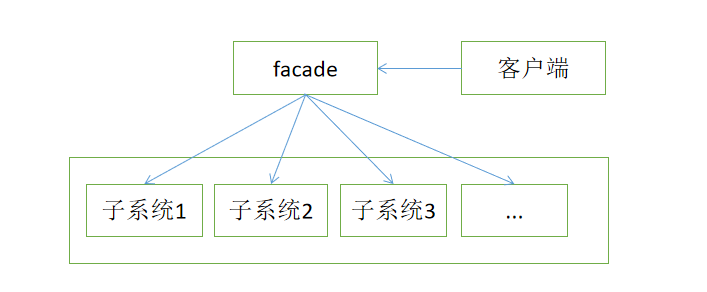设计模式:facade模式(Python)
facade模式,即门面模式,也称外观模式,这个模式的核心思想是使用facade对象为外部客户端提供一个统一的访问一组子系统的接口,即客户端不会直接与各个子系统交互,而是通过facade对象与各个子系统进行通信并使用子系统的相应功能。
可以通过下面这个图来理解facade模式:

子系统:各个子系统原则上都是独立存在的,互不干涉的,重要的是它们都不会去关注facade对象,更不会去引用facade对象。
facade:facade对象负责将各个子系统组合成在一起,并为外部提供一个“舒适的外观”和访问接口。
客户端:客户端通过facade对象去和各个子系统进行交互,不会直接去和各个子系统打交道。
简单示例:
class Shampoo: """子系统:卖各种洗发露""" def __init__(self): print('We sell all kinds of shampoo!') def piaorou_500ml(self, number): print('This is 500ml piaorou shampoo! Total: %d' % number) class WashingPowder: """子系统:卖各种洗衣粉""" def __init__(self): print('We sell all kinds of washing powder!') def libai_3kg(self, number): print('This is 3kg libai washing powder! Total: %d' % number) class Tissue: """子系统:卖各种抽纸""" def __init__(self): print('We sell all kinds of tissue!') def jierou_200sheets(self, number): print('This is 200 sheets tissue! Total: %d' % number) class Salesman: """facade:售货员""" def __init__(self): self.shampoo = Shampoo() self.washing_powder = WashingPowder() self.tissue = Tissue() print('What can I help you?') def sale_for_family(self): """家庭套餐""" self.shampoo.piaorou_500ml(1) self.washing_powder.libai_3kg(2) self.tissue.jierou_200sheets(6) class UncleLi: """客户端:李大爷""" def __init__(self): print('I want bug something!') def buy_for_family(self): """直接从售货员那里购买家庭套餐""" sale_man = Salesman() sale_man.sale_for_family()
其他与facade模式思想相近的编程原则也可以参考下,但需要注意的是“原则”本身需要根据具体情况来灵活应用,而不是一定要这么做:
最少知识原则:最少知识意味着需要尽量减少对象之间的交互,但是也需要注意以下几点:
- 在设计系统时,在创建每个对象时,都需要多考查下会与之交互的类的数量以及交互的方式。
- 避免多个对象彼此紧密耦合的情况。
迪米特法则:它是一个设计准则,包含以下几点:
- 每个单元对系统中其他单元知道得越少越好。
- 每个单元只与其朋友交流。
- 单元不应该知道它操作的对象的内部细节。



 浙公网安备 33010602011771号
浙公网安备 33010602011771号